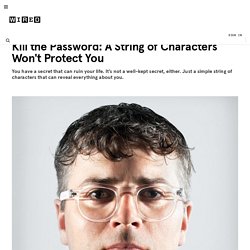

Kill the Password: Why a String of Characters Can't Protect Us Anymore. You have a secret that can ruin your life.

It’s not a well-kept secret, either. Just a simple string of characters—maybe six of them if you’re careless, 16 if you’re cautious—that can reveal everything about you. Your email. Your bank account. Your address and credit card number. No matter how complex, no matter how unique, your passwords can no longer protect you. Look around. This summer, hackers destroyed my entire digital life in the span of an hour. The age of the password is over. Since that awful day, I’ve devoted myself to researching the world of online security.
First thing I do? This summer I learned how to get into, well, everything. The common weakness in these hacks is the password. Passwords are as old as civilization. In 413 BC, at the height of the Peloponnesian War, the Athenian general Demosthenes landed in Sicily with 5,000 soldiers to assist in the attack on Syracusae. During the formative years of the web, as we all went online, passwords worked pretty well. Viruses, Trojans, and worms, oh my: The basics on malware. Some say we're living in a "post-PC" world, but malware on PCs is still a major problem for home computer users and businesses.

The examples are everywhere: In November, we reported that malware was used to steal information about one of Japan's newest rockets and upload it to computers controlled by hackers. Critical systems at two US power plants were recently found infected with malware spread by USB drives. Malware known as "Dexter" stole credit card data from point-of-sale terminals at businesses. And espionage-motivated computer threats are getting more sophisticated and versatile all the time. In this second installment in the Ars Guide to Online Security, we'll cover the basics for those who may not be familiar with the different types of malware that can affect computers.
Viruses are programs that can replicate themselves in order to spread from computer to computer, while targeting each PC by deleting data or stealing information. Keep it secret, keep it safe: A beginner’s guide to Web safety. My family has been on the Internet since 1998 or so, but I didn't really think much about Internet security at first.

Oh sure, I made sure our eMachines desktop (and its 433Mhz Celeron CPU) was always running the latest Internet Explorer version and I tried not to use the same password for everything. But I didn't give much thought to where my Web traffic was going or what path it took from our computer to the Web server and back. I was dimly aware that e-mail, as one of my teachers put it, was in those days "about as private as sticking your head out the window and yelling. " And I didn't do much with that knowledge. That sort of attitude was dangerous then, and the increasing sophistication of readily available hacking tools makes it even more dangerous now.
SSL and TLS, the invisible security blankets The most common kind of Web encryption is one many users probably don't even notice. How Secure Is My Password?